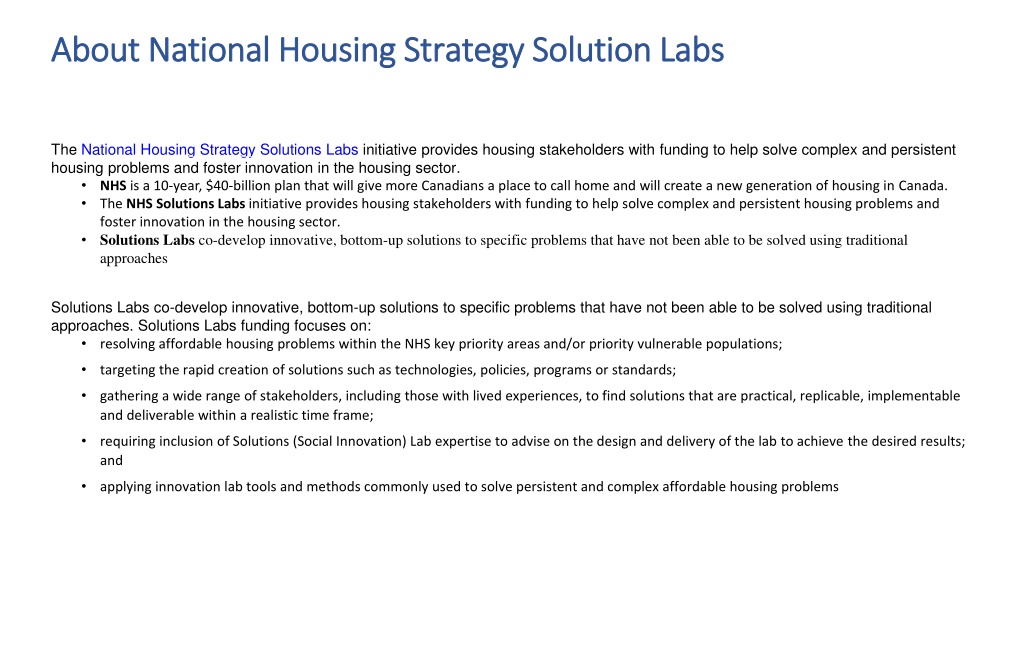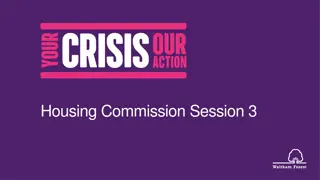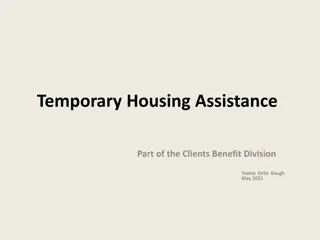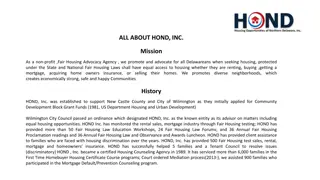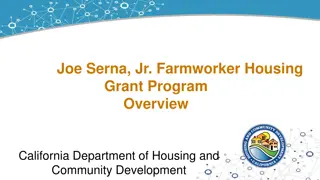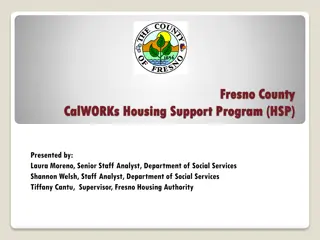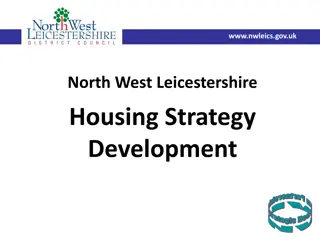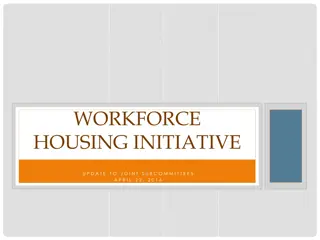National Housing Strategy Solution Labs Overview
The National Housing Strategy Solutions Labs initiative aims to address complex housing issues by providing funding to stakeholders for innovative solutions. With a focus on affordability and vulnerable populations, the Labs bring together diverse stakeholders to co-develop practical and replicable solutions using innovative methods. The project also recognizes the importance of accessible housing data for informed decision-making and proposes innovative approaches to address data collection and sharing challenges.
Download Presentation

Please find below an Image/Link to download the presentation.
The content on the website is provided AS IS for your information and personal use only. It may not be sold, licensed, or shared on other websites without obtaining consent from the author. Download presentation by click this link. If you encounter any issues during the download, it is possible that the publisher has removed the file from their server.
E N D
Presentation Transcript
About National Housing Strategy Solution Labs About National Housing Strategy Solution Labs The National Housing Strategy Solutions Labs initiative provides housing stakeholders with funding to help solve complex and persistent housing problems and foster innovation in the housing sector. NHS is a 10-year, $40-billion plan that will give more Canadians a place to call home and will create a new generation of housing in Canada. The NHS Solutions Labs initiative provides housing stakeholders with funding to help solve complex and persistent housing problems and foster innovation in the housing sector. Solutions Labs co-develop innovative, bottom-up solutions to specific problems that have not been able to be solved using traditional approaches Solutions Labs co-develop innovative, bottom-up solutions to specific problems that have not been able to be solved using traditional approaches. Solutions Labs funding focuses on: resolving affordable housing problems within the NHS key priority areas and/or priority vulnerable populations; targeting the rapid creation of solutions such as technologies, policies, programs or standards; gathering a wide range of stakeholders, including those with lived experiences, to find solutions that are practical, replicable, implementable and deliverable within a realistic time frame; requiring inclusion of Solutions (Social Innovation) Lab expertise to advise on the design and delivery of the lab to achieve the desired results; and applying innovation lab tools and methods commonly used to solve persistent and complex affordable housing problems
The Problem Space The Problem Space Without strong, accessible data, decision-makers can t make the best decisions to address housing supply issues. We have lots of housing data, but Community Data Lab Problem Statement Municipal governments and community-based organizations want to make decisions based on relevant, credible data. Planners, managers and analysts also recognize that community-level programs demand good data and a capacity to learn from detailed program results. - housing data is scattered, outdated, inconsistent, and not openly available - Housing Data if full of gaps especially for vulnerable populations Currently, decision-makers may see housing data as the 'black-box' domain of specialists in academia, data management, or policy think tanks. They may also come to see some types of interventions as inherently more reliable in delivering desired policy results on the ground simply because measurements of outputs, e.g., units delivered, seem clearer and are routinely produced for them. Unless there is deep and widespread real-time accessibility of a diverse range of outcomes-focused housing data, indicators, and decision guidance, risks of systemic failure will persist. That is the core decision-making problem to be addressed by this project. - Data collection limitations, which impacts availability, relevancy, timeliness - Data sharing limitations legal, business, other constraints limit sharing - Data governance challenges clear governance and standardization is lacking - And other challenges! Innovation can help raise awareness, explore solutions and improve decision-making. CMHC
CTLabs | The Lansdowne Group |1 Community Data Lab: Solutions Lab Phases This solutions lab project seeks methodological innovation in data collection, analysis and presentation. This leverages many other elements of housing solutions: increasing initial understanding of problems and how they are related; supporting evidence-based consensus on solutions; assessing end results for accountability; and identifying further innovation opportunities. Definition Discovery Development Prototype & Test Roadmap Test ideas and multiple potential solutions. and refine shared Communicate a clear path to realize the preferred solution, and to solution replication. Co-develop new ideas through Solutions Lab stakeholder input. Generate insight through big dataand user insight, understand the current state of the issue based on a range of research methodologies. Establish the scope of the lab and reframe theissue. uptake and LabPhases 3 4 5 1 2 Jan March 2022 (3months) April - Sept 2021 (6months) Nov - Dec2020 (2months) Dec 2020 March 2021 (4months) Oct - Dec 2021(3months) National level ideation session for local partners. Local engagement of stakeholders in design charettes/workshops; National and local engagement sessions to share ideas and confirm prototypes; Prepare prototypes for dissemination including designs for new data sets and/or new ways of organizing and presenting existing data, new and modified presentation graphics, including story boards for infographics and short videos; and, Prepare communication packages for distribution to participants and trial groups. Engage participants in design charettes/workshops, Test and refine phase 3 prototypes for new data sets, indicators, communication tools, stories with user audiences Follow-up survey all stakeholders; Lessons learned roundtable with senior CMHC and Statistics Canada officials, consortium leaders, and members of the Canadian Housing Policy Roundtable Preparation of roadmap document designed to move project results from concept to impact. Undertake research and survey stakeholders to determine priority housing & related urbanization/local development challenges, data gaps, and opportunity costs of missing data; Analyze results and report back to participants; Identify organizations who use housing and NHS priorities related data at a local level to ensure the system is engaged Prepare initial stakeholder engagement packages, comprising overarching questions for data sets, and devising how complex community data sets can be meshed with local priorities Confirm participants; Negotiate contracts; Detail work plan; Confirm workarounds and opportunities for COVID-19 impacts on project activities; and, Revisit the originally stated Problem Brief MainActivities Deliverables: Survey summary, research summary, systems map, Journey maps, DEL 2.1 Survey findings report (including further revisions to Problem Brief) KP 2.1 Stakeholder Engagement Package DEL 2.2 Community Partner Agreements Project Team Deliverables: Design and facilitate above sessions, KD 3.1 Stakeholder engagement package, KD 3.2 Presentations, KP 3.1 Workshop Reports, KP 3.2 Replicable, open-source designs for new data sets, KD 3.3 Communication packages. Deliverables: DEL 4.1 Engagement report, DEL 4.2 Outsider response Report, KP 4.1 Revised prototypes based on phase 4 feedback Deliverables: Clear definition of expected Lab outcomes, Governance Structure,, Research Plan, Workplan,DEL 1.1 Project Team Agreements, DEL1.2 Criticalpath,KP 1.1 R evised Problem Brief Rely on CDP Working Group Advise on research plan & approach Confirm metrics for success and approach to evaluation Advise on CommunicationsPlan Deliverables: DEL 5.1 Stakeholder survey report, DEL 5.2 Report lessons learned roundtable, DEL 5.3 Comprehensive roadmap, KP 5.1 Roadmap highlights report, KP 5.2 Evaluation report, and KP 5.3 Project Case study Advise on protypes Support securing approvalas needed Working Group Identify keystakeholders national and local Advise on research and mapping activities Advise on opportunities foraction Participate in roundtable Advise on strategy forchange Comment on roadmap Participate in ideation session (Optional) Participate in local sessions (Optional) Support ideationsession Advise on selection and curation of prototypes Roles Community Partners Participate in a lessons learned workshop Prepare Regional/Local stakeholder survey report, Provide input on reports Enter into partnership agreement Identify stakeholder groups, share survey with local stakeholders, participate in ethnographic interviews Participate in ideation session Host and facilitate local sessions Participate in national to confirm prototypes Review and help prepare communications material Lead Local prototyping activities Share lessons learned
Community Data Lab Governance Structure A clearly defined governance model and appropriate leadership has been established to support activities and to sustain momentum over time. Stakeholders Local Delivery Teams (Community Partner Micro Labs) Organizations and people who are part of the system. They would use data to make more informed decisions or are people with lived experience who are impacted by decision making. Stakeholders provide input in different ways throughout the lab (respond to surveys, participate in local sessions, participate in national sessions, review documents and provide input, etc.) Some of the stakeholders will be local and or national data lab participants. Accountable for local engagement activities to generate ideas and insights Participate in National engagement activities Participants may also provide technical subject matter expertise for the Lab. Project Team Working Group (National) Accountable for innovation lab design, decision-making, project management, stakeholder collaboration and engagement design, communications, evaluation, fund development, budget oversight, and design and implementation of the Lab activities. Taking the form of a CDP Working Group, accountable for providing strategic lab guidance, reviewing overall progress and recommendations, facilitating issue management, and providing insights on recommendations. 4
Example of Local Stakeholders Organizations working on Example of Local Stakeholders Organizations working on affordable housing and homelessness issues in St. John s affordable housing and homelessness issues in St. John s There are a variety of established organizations who provide support services, build and maintain housing, deliver programs to help people who are homeless or are having challenges with affordability of housing. Collectively, many of these organizations contributed to the 2019 Housing Needs Assessment and the City of St. John s Housing Affordability Strategy. Some of those organizations are listed below: Aids Committee of Newfoundland and Labrador Anglican Homes Inc. Association for New Canadians Canada Mortgage and Housing Corporation Canadian Mental Health Association NL Caribou Legion Manor CHANAL - Co-operative Housing Association NL Choices for youth Connections for Seniors Coalition of Persons with Disabilities NL City of St. John s Department of Advanced Education, Skills and Labour Department of Children, Seniors and Social Development, Poverty Reduction Division Eastern Health EMPOWER NL End Homelessness St. John s First Light Habitat for Humanity Iris Kirby John Howard Society Newfoundland and Labrador Housing Corporation Newfoundland and Labrador Housing and Homelessness Network Pleasant Manor Refugee and Immigrant Advisory Council Salvation Army SHOP - Safe Harbour Outreach Project Stella s Circle The Gathering Place The St. John s Women s Centre Marguerite s Place ThriveCYN
Terms of reference Terms of reference Term: The term of the Working Group aligns with the Project schedule which is set to conclude in March 2022. Date Topic of Meeting November 5, 2020 Introduction to Solutions Lab Project Meetings Virtual orientation/training session for facilitators January 12, 2021 Frequency and Location:The Committee will meet approximately every two months. All meetings take place online at https://cdp.adobeconnect.com/theboardroom. March 2, 2020 National insight generation workshop National level ideation session followed by microlabs engagement of local stakeholders ideation sessions April 6, 2021 Logistics, Agenda and Notes: Meeting invitations, agendas, and minutes will be coordinated by CDP and the Project Manager from the Lansdowne Consulting Group with the input of all members. A page on communitydata.ca will be created and all Working Group Members will receive access in order to share project documents. National session to share ideas from local microlabs & confirm prototyping approach June 15, 2021 September 14, 2021 Prototyping activities workshop November 9, 2021 Check in Financial Support:Community Partners can access a small grant to cover the costs of facilitation a Micro Lab such as the cost of a virtual meeting license or other technology tools. Grant requests should be made to michel@communitydata.ca. December 7, 2021 Check in Lessons Learned Roundtable / Road map engagement session February 8, 2022 Sharing project results and transition to post- project implementation March 8, 2022 Technology: A few different platforms will be used including Adobe connect, digital white board (Mural or Miro).
Benefits for Community Partners derived from Benefits for Community Partners derived from participation participation The project aims to integrate several innovations into the work of local planners, policy analysts, and decision- makers, including: Common indicators relevant to measuring housing results at the municipal and neighbourhood scale New data sources and uses of data, including data modeling Use of new software to support data visualization and data access Shared learning between provincial jurisdictions More effective feedback loops to better understand the impact of data on local decision making
